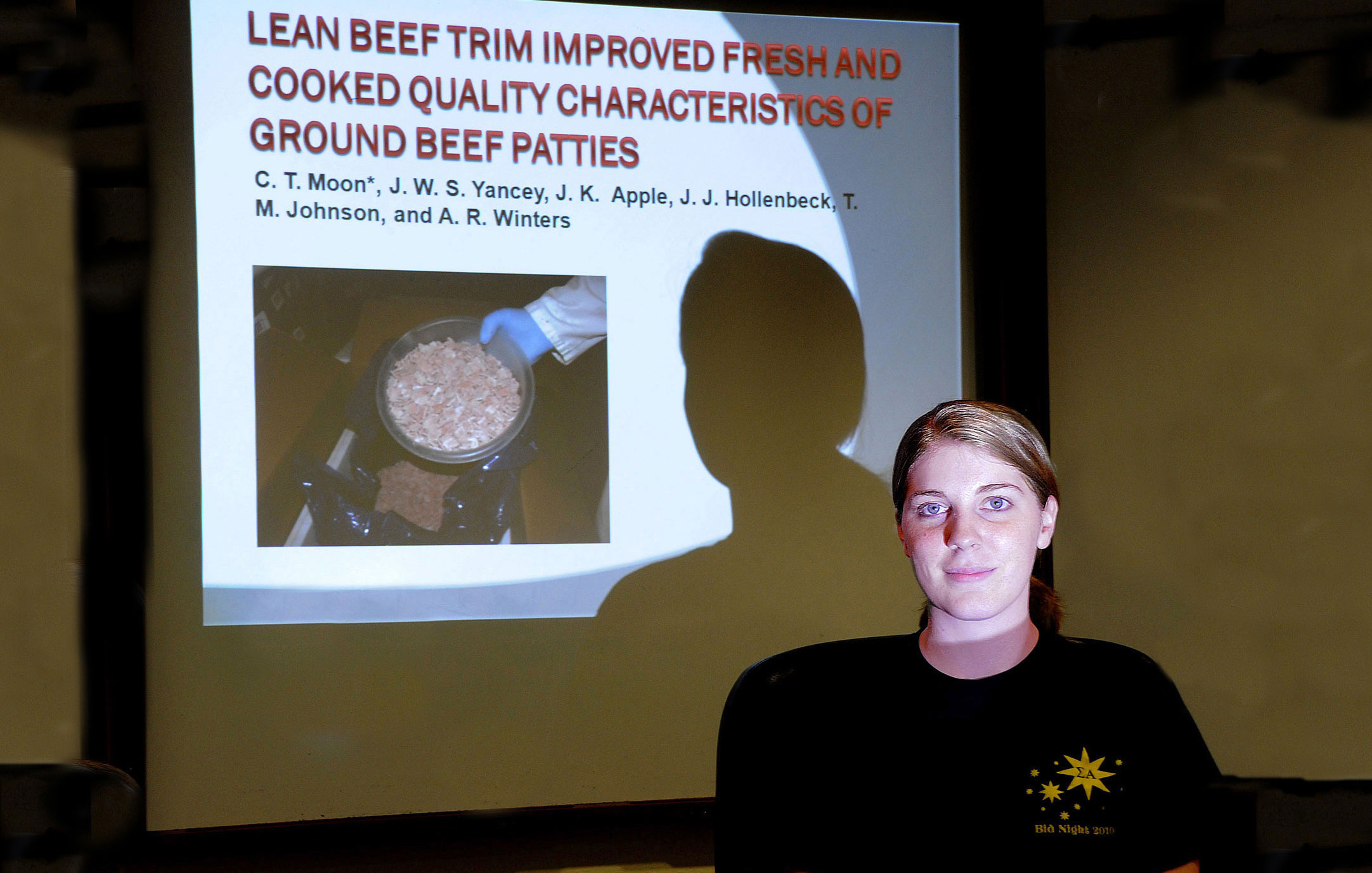
FAYETTEVILLE, Ark. – Consumers worried about the quality of ground beef based on recent media reports about “lean finely textured beef” used to increase the protein content of some ground beef products may be reassured by the results of a study conducted last fall by a University of Arkansas student majoring in animal science.
Courtney Moon, a senior from Fort Smith, presented a paper on the study at the annual student research competition March 14 sponsored by the Arkansas chapter of Gamma Sigma Delta, the Honor Society of Agriculture, and Dale Bumpers College of Agricultural, Food and Life Sciences. Winners had not been announced at this writing.
Moon's paper is titled, "Lean beef trim improved fresh and cooked quality characteristics of ground beef patties." She found that lean finely textured beef, or lean beef trim, added at levels up to 20 percent in ground beef improved fresh color, reduced spoilage and increased tenderness.
Meat science professor Jason Apple said Moon did an excellent job on the study, which he and his laboratory staff supervised. In addition to teaching, Apple conducts research as a University of Arkansas System Division of Agriculture scientist.
The study design included ground beef patties formulated in six replicated treatments. Patties were either 82 percent or 93 percent lean. A control group with no lean beef trim was compared to ground beef that contained 10 or 20 percent lean beef trim. The patties were frozen and then thawed and placed in a simulated retail display for five days before cooking.
"I was surprised," Apple said. "I just assumed the lean beef trim would negatively impact the quality of the burgers, but it actually made them better in this study."
The uncooked patties with 20 percent lean beef trim held up better than those without lean beef trim for five days in a simulated retail display in terms of meat color and TBAR (thiobarbituric acid reactive substances), which indicates damage by oxidative stress, or "spoilage," Moon said.
The pH, or alkalinity, of the 20 percent LBT burgers was higher than the control group. High pH can cause a red, uncooked appearance in cooked beef, Moon said, but there was no difference in the cooked color of any of the burgers in the study.
"I also expected the LBT burgers to be tougher, but they were more tender," Apple said. Tenderness was rated by a measurement of the force required to cut a patty.
"I am completely confident that ground beef with up to
20 percent lean beef trim is a safe and wholesome product," Apple said.
"I think it is a very beneficial product because it reduces the cost of a
pound of ground beef by about 20 to 25 cents per pound," he added.
"I understand the 'yuck factor' when people use a term like "pink slime" to describe lean beef trim, but I think it is a very good use of beef that otherwise would go into pet food or be thrown away. It is really all just beef," Apple said.
Moon, who will graduate in May, plans to continue her meat science studies in graduate school. She learned about lean beef trim during a trip with the U of A Meat Science Quiz Bowl team to a Tyson Foods beef plant in Texas. Apple said he could not answer all of her questions about it, and he encouraged her to conduct her research project in his meat science lab.
Most ground beef is made from lower grade meat, often from older cattle, and from meat that is trimmed off as a carcass is cut up. The U.S. Department of Agriculture mandates sanitary practices for cutting a carcass into "cuts" of meat that are familiar to consumers. At each stage in the process, trimmings of fat and protein are saved for use in ground beef, sausage and other products.
Apple explained that trimmings are rated by protein content and are added to ground beef or other products to adjust protein content of the final product. Until recently, trimmings with less than 50 percent protein were used only for extracting the fat for use in "tallow" products, and the remaining protein had little or no value.
Beef Products Inc., or BPI, developed a patented process to centrifuge the fat out of trimmings containing very low levels of protein. Apple said the resulting protein is misted with ammonia hydroxide, which is a food-grade antimicrobial widely used on fruits, vegetables and other foods. The resulting lean finely textured beef is rapidly frozen and packaged.
The ammonia hydroxide misting raises the pH of the product to a level that kills any bacteria that might cause food poisoning, Apple said.
A March 15 news release from the U.S. Department of Agriculture said: "USDA continues to affirm the safety of Lean Finely Textured Beef product for all consumers and urges customers to consult science based information on the safety and quality of this product. Lean Finely Textured Beef is a meat product derived from a process which separates fatty pieces from beef trimmings to reduce the overall fat content."
Contacts
Howell Medders, Coordinator
AGCS
479-575-5647,